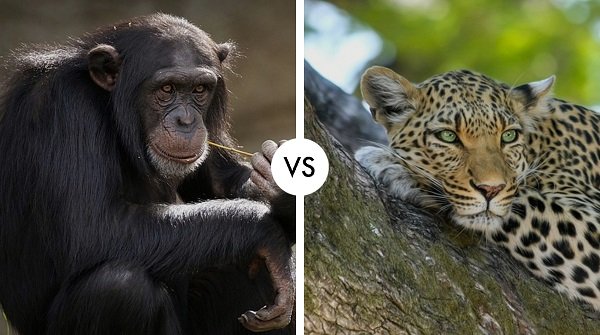G’day folks! Today we’re going to take a closer look at two of Africa’s most iconic animals: the chimpanzee and the leopard. These two predators are known for their strength, agility, and impressive hunting skills, but who would win in a one-on-one battle? Let’s find out!
Size and Strength:
When it comes to size and strength, the leopard has the upper hand. Adult leopards can weigh up to 90 kg, while chimpanzees rarely exceed 60 kg. Furthermore, leopards have powerful jaws and sharp claws that can easily kill prey, making them formidable opponents.
Fighting Experience and Technique:
Chimpanzees are known for their aggressive behavior and ability to fight. They are social animals and often engage in fights with other members of their troop to establish dominance. They use their powerful arms and hands to grapple with their opponents and have been known to kill other animals with their bare hands. Leopards, on the other hand, are solitary hunters and rarely engage in fights with other leopards. They rely on their stealth and surprise to take down their prey.
Aggressiveness and Temperament:
Both chimpanzees and leopards can be aggressive when threatened, but chimpanzees are known for their temperamental behavior. They have been known to attack humans, and have even been observed engaging in violent behavior towards their own kind. Leopards are more cautious and avoid human contact whenever possible.
Speed and Agility:
When it comes to speed and agility, the leopard is unmatched. They can run up to 58 km/h and are able to climb trees with ease, making them one of the most versatile predators in Africa. Chimpanzees are also agile, but their strength lies more in their ability to climb and swing through trees.
Endurance and Stamina:
Chimpanzees are known for their endurance and stamina. They can travel long distances and engage in physically demanding activities for extended periods of time. Leopards, on the other hand, rely on short bursts of energy to take down their prey, and tire quickly.
Weapons or Defensive Mechanisms:
Both chimpanzees and leopards have their own unique set of weapons and defensive mechanisms. Chimpanzees use their powerful arms and hands to fight, while leopards rely on their claws and teeth. Leopards also have the ability to blend into their environment and avoid detection.
Ability to Finish Opponent:
When it comes to finishing off an opponent, both chimpanzees and leopards are skilled predators. Chimpanzees have been known to kill other animals with their bare hands, while leopards use their powerful jaws and sharp claws to dispatch their prey quickly.
What do they normally prey on?
Chimpanzees are omnivores and feed on a variety of foods, including fruit, nuts, insects, and small mammals. Leopards are carnivores and primarily feed on antelopes, gazelles, and other small to medium-sized mammals.
So, who would win in a one-on-one battle between a chimpanzee and a leopard? Based on the above factors, it’s difficult to say. The leopard has the size and strength advantage, but the chimpanzee is a skilled fighter with impressive endurance and stamina. In a one-on-one fight, the leopard would likely win, but the chimpanzee would put up a good fight and could potentially come out on top.
However, when it comes to group or herd support, the chimpanzee has the advantage. Chimpanzees live in large troops and have been known to gang up on predators to protect their young or defend their territory. In contrast, leopards are solitary animals and would not have the support of a group or herd.
In conclusion, both chimpanzees and leopards are impressive predators in their own right, and it’s difficult to say definitively which one would win in a one-on-one battle. However, based on the factors outlined above, the leopard would likely have the advantage in a one-on-one fight, while the chimpanzee would be more successful in a group setting.
It’s worth noting that in the wild, these animals rarely come into direct conflict with one another. They have evolved to avoid confrontation whenever possible, and each species has its own unique set of skills and adaptations that allow them to survive and thrive in their environment.




